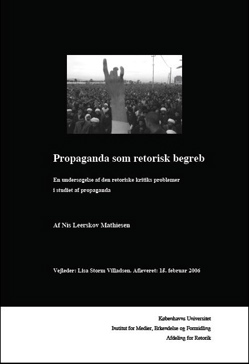Done and done
My dissertation has been turned in and I have been turned out, almost. Yippiekaiay!

Abstract: Propaganda as a rhetorical concept
The concept "propaganda" is being used extensively in contemporary media, politics and popular culture. This has led to a recent revival of the academic study of the phenomenon. The properties of propaganda are being debated extensively. The rhetorical tradition in its modern incarnation however, has not really stood out in this debate, despite its preoccupation with ethical communication in general. This striking lack of interest and insight in the term propaganda on behalf of rhetorical criticism is being investigated from a thesis that holds that rhetoric has epistemological features, that in turn obscures vital features of propaganda.
First a sketch of the common notion of propaganda is outlined and then nuanced to form a foundation for three critiques, focusing on the rhetorical epistemology concerning propaganda. First it is shown that the rhetorical orientation towards the individual is not sufficiently nuanced when discussing propaganda. The classical conception of intention and perception in the humanities has neglected the influence that social environs impart upon the individual's intention and perception. This questions the notion of propaganda as mysteriously manipulative. There has been an extensive rhetorical interest in "ideology" but the findings here have not been applied to propaganda. The next critique questions the rhetorical assumptions about social entities such as the organisation and the mass. In rhetorical texts these are often treated as a synecdoche of the individual and thus fails to account for unique rhetorical features. This deficit is in contrast to the extensive rhetorical work on the conception of a "public sphere". The last critique concerns itself with ideas of power in rhetoric. It holds that the Platonic criticism of rhetoric as an unethical technique has imparted the rhetorical tradition with a suspicion of power, both in the form of actual power and the will to power. This is especially seen in the idea of agonism as a feature of propaganda and highlights an estrangement towards the basic competition as a driving feature of rhetorical action. The critique ends with a suggestion for the abandonment of an essential conceptualisation of propaganda and an enlargement of rhetorical criticism in the form of a "rhetorical sociology". This sociology will be able to deal with "background" features of communication and its level of description is illustrated by the call for a differentiation between demagogy and propaganda: Demagogy bearing resemblance to most traditional rhetorical propaganda analysis, propaganda concerning itself with the extra-individual features shown in the critiques.



5 Comments:
Tillykke!!!
16/2/06 16:24
Også stort tillykke herfra! Ditte
16/2/06 18:04
This post has been removed by a blog administrator.
16/2/06 23:07
Jeps, tillykke med det!
Det lyder tilmed interessant - kommer der snart en artikelversion, så man ikke enten skal læse alle firs sider eller nøjes med en sides appetitvækker...
16/2/06 23:12
Congrats bud.
18/2/06 01:45
Post a Comment
<< Home